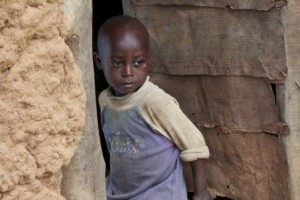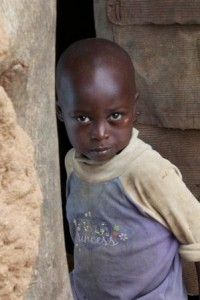What is your greatest dream for you and your family? What do you wish for most for your children? For just one moment, ask yourself these two questions and imagine all the possibilities.
And now let me tell you a story.
It was my first morning in Rwanda and already I was feeling overwhelmed by the beauty and harsh realities of this amazing country. As we drove south out of the capitol city, Kigali, to the Mareba district, everything I saw was foreign to me but somehow familiar at the same time. All the images I’d ever seen of Africa were right here on the road we were traveling?women carrying babies on their backs while balancing giant bundles on their heads, men on bicycles taking banana bunches to market, a blast of music from a passing mini-bus, and luscious green hills opening up to wide vistas as we wound our way out of the city into the countryside. It was a bright and sunny day, the wind blowing through banana trees. By the time we reached the village of Ruduha, I was enamored with and at ease in this new, exciting place.
But the harsh reality of what my travel companions and I were there to see quickly rushed in. That morning we were visiting families with severely malnourished and sick children. These families had little or nothing to eat on a daily basis and their children were often sick from malnutrition. We were there specifically to visit Emmanuel Hategeka, a 5-year-old boy with enormous eyes and a sweet disposition. Emmanuel’s family lives in a mud house, not unusual for most rural Rwandan families, but as we went inside I saw that there was nothing–no bowls, no cups, no clothes, no bed.
 Emmanuel is 5 years old and lives in Ruduha village in Rwanda.
Emmanuel is 5 years old and lives in Ruduha village in Rwanda.Emmanuel’s family had one possession, a grass mat. The family had proudly put the mat–which is used by the family to sleep on every night–out in front of the house to greet us when we arrived. As we spoke with Emmanuel’s mother about his health and the family’s access to food, we learned that he and his two sisters, Jacqueline (4) and Josiane (1), often just eat cassava. Cassava is a tuber root similar to potatoes, and while it is a good source of carbohydrates, it does not provide enough protein or other nutrients to help children like Emmanuel develop strong and healthy bodies. When we asked when the family had last eaten, Emmanuel’s mother did not immediately answer. It was as if she was trying to remember when it had been. Today? Yesterday? She could not tell us for sure.
One of my colleagues asked Emmanuel’s mother, “What is the greatest dream for your family? What do you wish for most for your children?” Her answer was, “Three days of food.”
Three days of food.
I could see the devastating effects of malnutrition in Emmanuel. Although he was intrigued and excited to be the center of attention by this group of strange visitors, he quickly tired and had trouble standing and staying awake. Emmanuel’s body was so tired from lack of food that he was falling asleep as we filmed and interviewed him. My vibrant morning and feelings of exhilaration vanished at that moment–this is what we had come to see and the reality was that this 5-year-old boy was starving.
The work we were there to do–identifying these real-life stories of need–will hopefully bring many, many new donors to Heifer International. My hope is that it will allow us to increase the number of families we can reach in Rwanda and all across the world, so that children like Emmanuel have nutritious milk and eggs to eat every day, and have the chance to grow up healthy and strong, to go to school and to have medicine when they are sick. We need as many partners as we can to reach these families and help them lift themselves up out of poverty and hunger.
 Emmanuel stands outside his family's house in the Mareba district of Rwanda.
Emmanuel stands outside his family's house in the Mareba district of Rwanda.I had to remind myself of the good work that Heifer does and the good work we will continue to do as I watched Emmanuel struggle to stay awake. I reminded myself when I thought of Emmanuel’s mother and what she must feel knowing that her children won’t eat that day. I remind myself of the good work we do so that we can give mothers like her bigger dreams for their children instead of the daily struggle just to keep them alive.
And I reminded myself of it when we drove away from their village after thanking the family so much for allowing us to meet with them. I imagined what the rest of their day would be like, as the sun begins to set and no fire is made and no food is being cooked. And Emmanuel goes to sleep with his mother and father and two sisters on the mat on the floor of their house, with an empty stomach, again.